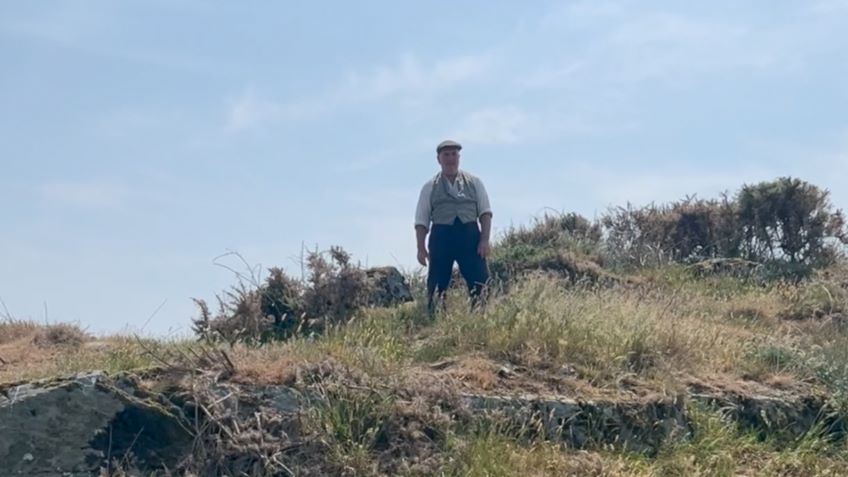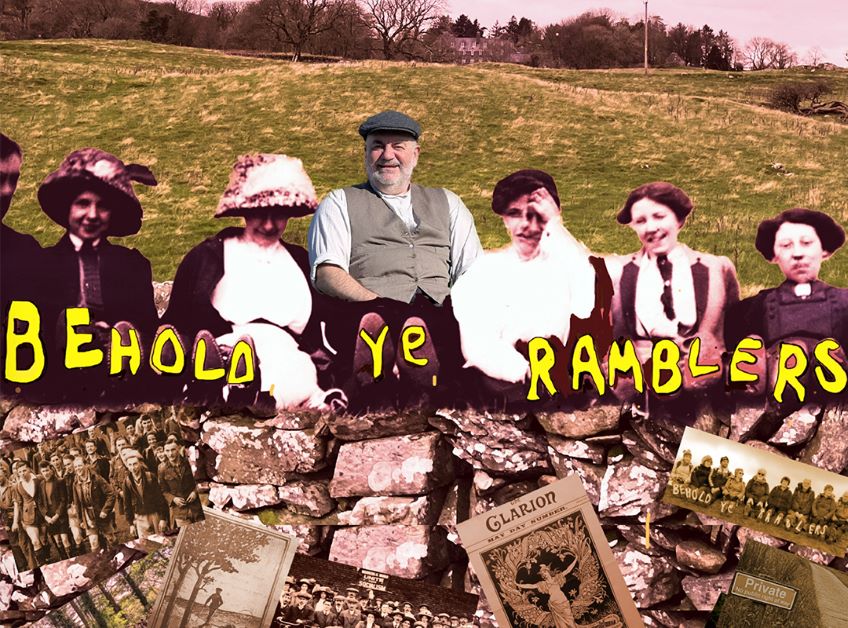Warmly intimate and entertaining, serious yet wonderfully light-hearted, Behold Ye Ramblers brings vibrant variety and interest to a slice of history that has eternal relevance. From the outset, with natural rapport and amiable manner, Neil Gore, relaxed yet passionate, draws in the audience and keeps them involved throughout.
It’s one of ten plays this actor, playwright, songwriter, singer, musician, poet and programme-seller has written for Townsend Theatre Productions, a company focused on celebrating inspirational, pivotal campaigners of the past, people of great vision, whose huge contributions to the betterment of society are not widely enough appreciated.
Behold Ye Ramblers takes us to the 1890s and early 1900s and the birth of The Clarion, the first newspaper that dared highlight the horrendous conditions suffered by the working classes, setting them alongside stories of luxurious extravagance amongst the wealthy. Capturing the hearts and minds of thousands, the Clarion Movement burgeoned: Clarion Houses, horse-drawn Clarion vans, Scouts and Pioneers sprang up in a bid to help alleviate the horrors of dire poverty with community activities such as choirs, drama, handicrafts, cycling, and rambling in clean, tranquil, open spaces never experienced before.
Emerging through dark curtains onto the little Victorian set, flamboyantly fanning out his red-lined cloak and invoking instant comedy, Neil Gore grabs the audience with a bit of banter and sets them down in a Music Hall. Gavel in hand, with worthy Leonard Sachs wordiness, he embarks on outrageous outpourings of ostentatious orations and pretentious, proclamatory pronouncements – but where is the singer he introduces? Clue: this is a one-man show of many parts. Eventually turning up in his smart suit, waistcoat and bowler, it’s Neil Gore again with a Cockney rendition of, I Live in Trafalgar Square.
Music Hall left behind, Gore goes on to sing and enact the life and times of pioneering socialist and founder of The Clarion in 1892, the worthy Robert Blatchford – briefly taking the part of the Red Countess of Warwick, too. In Act II, he’s G.H.B.Ward, leader of the Sheffield Clarion Ramblers, champion of the fight for the right to roam, something people in other countries still don‘t have. Both men inspired colossal followings and their legacies benefit us hugely today; both fought tirelessly for equality and justice for society’s underdogs and Blatchford’s pen name was Nunquam Dormio – I never sleep. Strongly imbuing both men with good hearts, strong resolution and good humour, Gore tells their stories, bringing them to sparkling life through spoken scenes and song as they address meetings or meet with others. The warm, lovable comedy lent to Sheffielder Ward particularly delights.

The compact set features a chunk of brick wall, where a bicycle (with tinkling bell) awaits the founding of The Clarion Cyclists, a large, dark barrel on which to perch, a series of useful platforms, Blatchford’s old journalist typewriter atop a table later draped in William Morris cloth, and curtains that serve brilliantly as a screen for the neat integration of poignant newspaper pages, photos, posters or moving video footage of slums and workplaces. Terrible to behold are the grim, tortured lives of dire poverty and squalor led by the wretched masses of the working population, exploited ruthlessly by employers as they slave for long, relentless hours in heat, filth and danger to avoid starvation. In one scene, Blatchford visits a St Helen’s chemical factory, where there’s no whiff of health and safety in the air – just burning, corrosive chlorine.
For all the grimness portrayed, the integrated humour, folk-flavoured songs and music play major, uplifting roles throughout. Mainly penned, adapted, arranged and sung by Gore with simple, pleasing clarity and rhyme, the songs serve to further the characters and narrative while fine backing tracks from guitar, percussion, keyboard and vocals, conjured up at the slick touch of a button, have been pre-recorded by the man himself. And just as the grim, graphic images evoke perfectly the atmosphere and feel of the lives of those who suffered, the sound of bird song on our idyllic, poetic Peak District ramble and the steam of the train at the station where everyone assembles evoke joy and hope.
Meanwhile, in true Clarion spirit, Doncaster’s Quirky Choir sings harmonious songs from the balcony, way up high, with Edward Carpenter’s The People To Their Land, the audience joining them in We’ll Turn Things Upside Down, further demonstrating the Clarion’s maxim: Fellowship is Life.
A most enjoyable piece of theatre, from which we emerge, educated, informed, but above all, most delightfully entertained and uplifted.
Eileen Caiger Gray
The production is now touring. You can find out more information by following this link.




